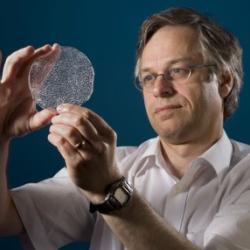Biography
Eric Wolff is a Royal Society Research Professor in the Department of Earth Sciences at Cambridge University. He is a Fellow of Darwin College and an Honorary Fellow at the British Antarctic Survey. After graduating as a chemist, he has studied ice cores from the Antarctic and Greenland for the past 40 years, using them to understand changing climate, as well as changing levels of pollution in remote areas. He also carries out research into the chemistry of the lower parts of the Antarctic atmosphere. Until June 2013, he led a programme at the British Antarctic Survey. He chaired the science committee of the European Project for Ice Coring in Antarctica (EPICA), which produced 800,000 year records of climate from the Dome C (Antarctica) ice core and for many years co-chaired the international initiative (IPICS) to coordinate future ice core research. His main research goal is to understand the causes of climate evolution over recent glacial cycles. He chaired the Royal Society's Global Environmental Research Committee until 2018, and led the Royal Society team in a joint initiative with the National Academy of Sciences on explaining climate science “Climate change: evidence and causes” in 2013 (updated in 2020).
Research
Palaeoclimate from ice cores
I study past climate and environment, mainly from polar (Antarctic and Greenland) ice cores. Ice in the polar regions preserves a unique chronological archive of information about the past. This extends so far 800,000 years in Antarctica and 128,000 years in Greenland. In collaboration with the British Antarctic Survey (also in Cambridge) and colleagues overseas, I collect ice cores, analyse them, and draw conclusions about the mechanisms of climate change.
The ice builds up year by year and stores information in three main ways: the isotopic content of the water molecules themselves tell us about past temperature; soluble and insoluble impurities trapped on the snow surface and in snowflakes record information about aspects such as past volcanic eruptions, sea ice extent, and biomass burning; finally air bubbles trapped in the ice record atmospheric composition including past greenhouse gas concentrations.
The longest (in time) record we have came from the European Project for Ice Coring in Antarctica (EPICA) ice core at Dome C, Antarctica. This has shown how climate, CO2, and many other properties co-varied through a series of glacial-interglacial cycles.
My current research concentrates on a number of topics:
- The dynamics of glacial cycles and millennial scale climate change
- The climate of interglacials (warm periods such as the present one)
- The state of the West Antarctic Ice Sheet during the last interglacial, and its contribution to sea level. This is done through an ERC Advanced Grant awarded to me in 2017, Warm Climate Stability of the West Antarctic Ice Sheet in the last interglacial (WACSWAIN).
- Proxies for sea ice in ice cores and other media: this includes work within the UK BLOWSEA project; I co-chaired the (now former) PAGES Sea Ice Proxy working group
- Records of volcanic eruptions in polar ice cores
- Polar atmospheric chemistry, especially as it relates to understanding the ice core record
- The search for oldest ice. We (through the European "Beyond EPICA - Oldest Ice" project) plan to drill an ice core reaching back 1.5 million years.
Publications
Recent publications can be found in the publications database here

